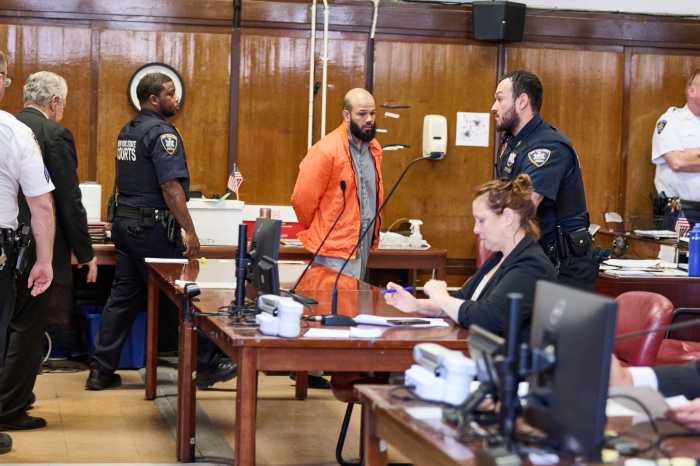Disgraced and expelled twice from the Alabama Supreme Court, Roy Moore is now the Republican candidate for the US Senate. | ALABAMA SUPREME COURT
In a stunning repudiation of the Republican establishment in Washington and President Donald Trump personally, GOP voters in Alabama on Tuesday chose disgraced former Supreme Court Chief Justice Roy Moore over Luther Strange, appointed earlier this year to take the seat vacated by Attorney General Jeff Sessions, as their candidate in a special election scheduled for December 12.
With 100 percent of precincts reporting, Moore captured just under 55 percent of the vote, in a runoff against Strange. Neither had garnered the required majority in a multi-candidate primary on August 15.
Moore now faces Democrat Doug Jones, a former US attorney, on December 12. A Democrat has not been elected to a statewide office there since 1992, when Senator Richard Shelby, who was then a Democrat but switched parties two years later, won a second term.
Moore’s checkered past includes two expulsions from the Alabama Supreme Court — last year due to his resistance to the US Supreme Court’s 2015 Obergefell marriage equality ruling and in 2003 when he defied a federal appeals court that found that his installation of a granite 10 Commandments monument in the State Supreme Court building violated the constitutional separation of church and state.
Anti-gay bigot, twice removed from Alabama Supreme Court, now GOP US Senate candidate
Though Moore failed in two bids for governor — in 2006 and 2010 — he was elected State Supreme Court chief justice again in 2012. It was his resistance to the marriage equality advances over the next several years that led to his most recent expulsion from the court.
An evangelical Christian who routinely elevates God’s law above man’s, Moore has taken a wide array of other inflammatory positions on public policy questions. He supported Trump’s birther attacks on the question of Barack Obama’s American citizenship and qualification for the presidency, hanging on to that viewpoint even after the new president abandoned the canard late in last year’s campaign, according to CNN.
In a 2006 op-ed on WorldNetDaily.com, a fringe right-wing site, Moore lashed out at Minnesota Democratic Congressmember Keith Ellison for swearing his oath of office on the Quran, writing, “Muslim Ellison should not sit in Congress.” Moore likened the Quran to Adolf Hitler’s “Mein Kampf.”
Arguing at a campaign stop earlier this month that America is divided by a new Civil War, Moore referred to friction not only between blacks and whites, but also between “reds and yellows.”
In a speech to a Baptist congregation early this year, Moore seemed to blame the 9/11 attacks on the atheism and godlessness of American society, according to CNN. The US had angered God because “we legitimize abortion” and “we legitimize sodomy.”
Sodomy and LGBTQ rights generally have long been in his sights. In a 2002 custody case involving a lesbian mother, Moore, in his first stint as Alabama chief justice, wrote that homosexuality is “an inherent evil… destructive to a basic building block of society — the family.” The mother, he wrote, did not deserve custody because “if a person openly engages in such a practice, that fact alone would render him or her an unfit parent.”
Three years later, after the US Supreme Court, in its Lawrence v. Texas ruling, struck down all sodomy laws, Moore, then gearing up for his 2006 gubernatorial bid, told C-SPAN, “Homosexual conduct should be illegal… It is immoral. It is defined by the law as detestable.” In a debate during that race, he charged that “sodomy and sexual perversion sweep the land.”
Moore’s obsession with homosexuality would eventually doom his second act as Supreme Court chief justice. The trouble started shortly after US District Judge Callie V.S. Granade, in January 2015, issued rulings striking down Alabama’s ban on marriage by same-sex couples. Even during a brief stay she placed on her ruling to allow the state to seek a longer stay from higher courts — an effort the Supreme Court turned back on February 9 — Moore began agitating against Granade.
In a January 27 letter to Republican Governor Robert Bentley, asserting that the US Constitution gave the federal judge no authority for her ruling affecting marriage, which he termed a “divine institution,” Moore wrote, “I ask you to continue to uphold and support the Alabama Constitution with respect to marriage, both for the welfare of this state and for posterity. Be advised that I stand with you to stop judicial tyranny and any unlawful opinions issued without constitutional authority.”
On the evening prior to the Supreme Court denying Alabama’s request for a longer stay, Moore took the extraordinary step of issuing an order holding, “Effective immediately, no Probate Judge of the State of Alabama nor any agent or employee of any Alabama Probate Judge shall issue or recognize a marriage license that is inconsistent with” with the state’s constitution.
Moore’s order was not a response to any court filing but rather undertaken, he explained, in his role as the “administrative head of the judicial system” in the state. Like the State Supreme Court justices, however, Alabama’s county probate court judges win their office in partisan elections.
President Donald Trump, repudiated by Alabama Republicans in his support for Senator Luther Strange, now tweets, “Roy, WIN in Dec!” | WHITEHOUSE.GOV
On March 3, 2015, the entire Supreme Court formalized Alabama’s judicial resistance to Granade’s authority, in a ruling that asserted that while “state courts on federal questions are ultimately subject to review by the United States Supreme Court… state courts may interpret the United States Constitution independently from, and even contrary to, federal courts… Legal principles and holdings from inferior federal courts have no controlling effect here, although they can serve as persuasive authority.”
Less than four months later, of course, the US Supreme Court hopscotched over the Alabama court’s objections to paying heed to the lower federal courts in its Obergefell marriage equality ruling.
Still, the question in Alabama remained unsettled, at least in Roy Moore’s mind. It was not until early 2016 that the State Supreme Court ruled on all the prior marriage equality proceedings to resolve the question of probate judges’ responsibility for issuing marriage licenses to same-sex couples. On January 6 of last year — more than six months after the Obergefell ruling — Moore, once again acting as “administrative head of the judicial system,” ordered the state’s probate judges to refrain from issuing licenses until the State Supreme Court acted.
Its ruling finally came on March 4, in a one-sentence order acknowledging the primacy of the US Supreme Court. Yet, in a nearly 100-page “special concurrence,” Moore fervently denounced Obergefell, in part echoing the views of the dissenting US Supreme Court justices in that case, but also asserting that “marriage” is an institution ordained by God and that it is beyond the scope of judicial power to “redefine” it. He also continued in his assistance that Obergefell only governed marriage in the four states of the Sixth Circuit that were defendants in that case.
Moore’s assertions that Alabama was entitled as a sovereign state to reject federal interference with its marriage laws, coupled with the series of disruptive actions he took in his orders to the state’s probate judges, led to allegations he had violated provisions of the ethical code for judges. With formal charges brought against Moore, the state’s Court of the Judiciary found a string of ethical violations and suspended him from office in September of last year.
Which looked to be the end of his career since, at 69, he was just one year shy of the age limit on once again seeking election as chief justice. The vacancy created by Sessions’ move to the Justice Department, coupled with right-wing anger at Senate Republicans for their inability to deliver on any of Trump’s or the party’s promises, created the opening Moore needed for a comeback.
Published reports indicate that Trump was reluctant to weigh in on the primary contest, with early polls giving Moore a big advantage over Strange, who faced questions about his appointment, while state attorney general, to the Senate by Bentley as the governor faced potential impeachment in a corruption and sex scandal that shortly afterward led to his resignation. Senate Majority Leader Mitch McConnell, who sunk a reported $10 million into Strange’s campaign, is said to have convinced the president.
The result of that lobbying led to last Friday’s bizarrely divisive speech Trump delivered in Huntsville, where he unleashed a weekend of controversy and pushback against his attack on Colin Kaepernick, a former 49ers quarterback who knelt during the pre-game playing of the national anthem to protest police violence against African Americans.
During that 90-minute rant, the president, with Strange standing nearby, waffled in his support for the sitting senator, saying, “I might have made a mistake and I’ll be honest, I might have made a mistake.” Trump then said should Moore win the runoff, he would be “campaigning like hell” for him in the general election campaign.
So on Tuesday evening, as the returns came in, the @realDonaldTrump tweets urging a vote for Strange suddenly disappeared. At 10:17 p.m., the president tweeted, “Congratulations to Roy Moore on his Republican Primary win in Alabama. Luther Strange started way back & ran a good race. Roy, WIN in Dec!”
The president is now all-in for the bigot.



















